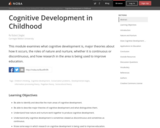
Text and links to all ancillary materials for Module 24
- Subject:
- Psychology
- Social and Behavioral Sciences
- Material Type:
- Module
- Reading
- Teaching/Learning Strategy
- Author:
- Robert Siegler
- Date Added:
- 05/31/2021

Text and links to all ancillary materials for Module 24

How do individuals and families interface with larger systems, and how do therapists intervene collaboratively? How do larger systems structure the lives of individuals and families? Relationally-trained practitioners are attempting to answer these questions through collaborative and interdisciplinary, team-focused projects in mental health, education, the law, and business, among other fields. Similarly, scholars and researchers are developing specific culturally responsive models: outreach family therapy, collaborative health care, multi-systemic school interventions, social-justice-oriented and spiritual approaches, organizational coaching, and consulting, among others. This course explores these developments and aims at developing a clinical and consulting knowledge that contributes to families, organizations, and communities within a collaborative and social-justice-oriented vision.
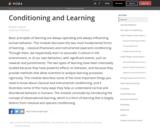
Text and links to all ancillary materials for Module 13
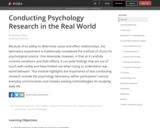
Text and links to all ancillary materials for Module 4
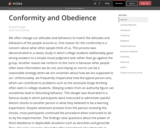
Text and links to all ancillary materials for Module 47
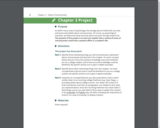
As within many areas of psychology, the average person holds both accurate and inaccurate beliefs about consciousness. Of course, as psychological scientists, we determine what we know about any topic through empiricism. The purpose of this project is to have you explain how a variety of areas of consciousness could have a positive effect in a student’s life.
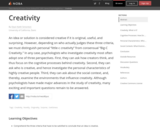
Text and links to all ancillary materials for Module 21
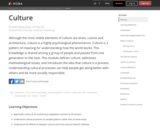
Text and links to all ancillary materials for Module 6
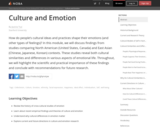
Text and links to all ancillary materials for Module 34
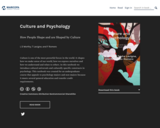
Culture is one of the most powerful forces in the world. It shapes how we make sense of our world, how we express ourselves and how we understand and relate to others. In this textbook we introduce cultural universals and culturally specific constructs in psychology. This textbook was created for an undergraduate course that appeals to psychology majors and non-majors because it meets several general education and transfer credit requirements.
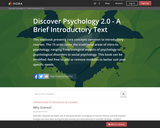
This textbook presents core concepts common to introductory courses. The 15 units cover the traditional areas of intro-to-psychology; ranging from biological aspects of psychology to psychological disorders to social psychology. This book can be modified: feel free to add or remove modules to better suit your specific needs.
This book includes a comprehensive instructor's manual, PowerPoint presentations, a test bank, reading anticipation guides, and adaptive student quizzes.
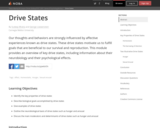
Text and links to all ancillary materials for Module 30
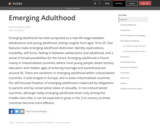
Text and links to all ancillary materials for Module 27
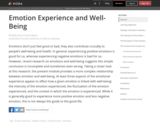
Text and links to all ancillary materials for Module 32
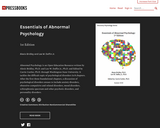
Abnormal Psychology is an Open Education Resource written by Alexis Bridley, Ph.D. and Lee W. Daffin Jr., Ph.D. and Edited by Carrie Cuttler, Ph.D. through Washington State University. It tackles the difficult topic of psychological disorders in 8 chapters. After the first three foundational chapters, a discussion of psychological disorders ensues to include anxiety disorders, obsessive-compulsive and related disorders, mood disorders, schizophrenia spectrum and other psychotic disorders, and personality disorders.
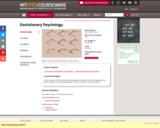
Current research on the evolution and development of cognition and affect, including intuitive physics, biology, and psychology, language, emotions sexuality, social relations.
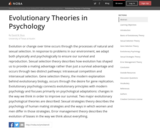
Text and links to all ancillary materials for Module 9
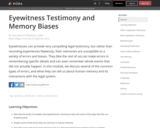
Text and links to all ancillary materials for Module 17
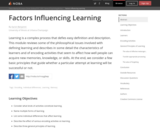
Text and links to all ancillary materials for Module 16
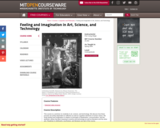
Seminar on the creativity in art, science, and technology. Discussion of how these pursuits are jointly dependent on affective as well as cognitive elements in human nature. Feeling and imagination studied in relation to principles of idealization, consummation, and the aesthetic values that give meaning to science and technology as well as literature and the other arts. Readings in philosophy, psychology, and literature.